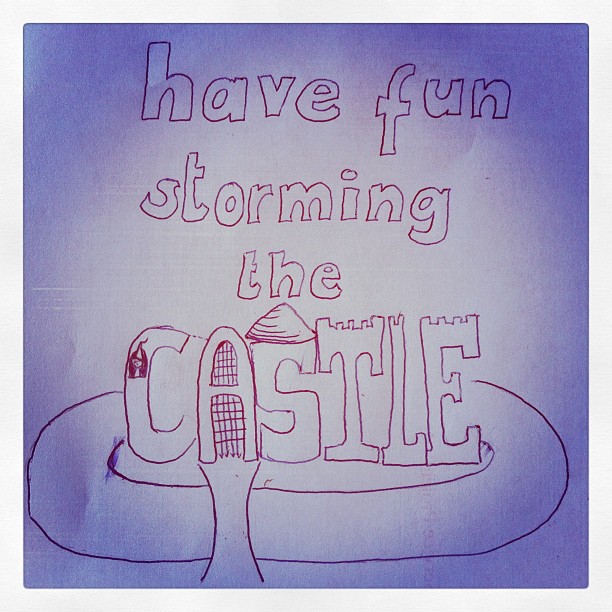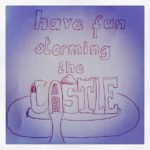Writing and crafting a good story is hard work. But there is joy in it too. Otherwise what would be the point?
I was reminded of this when quoting one of my favourite lines from the movie, The Princess Bride.
The heroes are off to take on bad guys. The odds are against them and they have a hard, painful and probably futile fight ahead of them. Neverless Miracle Max and his wife Valerie wave them off cheerfully, crying,
“Bye, boys! Have fun storming the castle!”
Writing a story is a lot like storming a castle and there is a lot we writers could learn from Wesley, Inigo, Fezzik, Buttercup and yes, even Vizzini, as we storm the gates of our stories.
Have a good reason to storm the castle
Castles are strong. They were built specifically to withstand a good storming, employing all kinds of tricks to repel attackers. You had to have a damned good reason to want to storm a castle. As we know, Wesley had the most important reason to storm his castle (‘true love’). No lesser cause would have compelled him to overcome the difficulties of overpowering enemy manpower, a locked gate with only one key, and having been mostly dead all day.
You need a good reason to write. Even if you lose faith at times, at one point you believed enough in this story, this character or the lesson you felt you could share, to begin the audacious process of breaking through fear, apathy and laziness and begin writing this story. Hold fast to that reason. Your story is worth fighting for.
Formulate A Plan
It may not seem like the heroes have much going for them, but they take stock of their resources (“If only we had a wheelbarrow”), examine their strengths (“your brains, Fezzik’s strength, my steel”), and come up with a plan, long before they take their first step towards the castle gate.
Don’t assume that, just because you like to write, you can sit down and create a whole story without doing any planning. You don’t have to know what will happen at every step of your plan but you need something to build on. Every story needs a hero, a setting, and some movement (something must happen or change between the beginning and the end). Do you know what must change for your character? (even if you don’t know *how* it will change).
You don’t even have to form a plan before you begin writing (the heroes have left to storm the castle before Wesley even wakes up, never mind begins to form his plan), but perhaps, like Wesley and his friends, you should pause at the edge of the woods to take stock, and plan the next stage of your battle every so often.
Be Flexible
WESLEY: Now, there may be problems once we’re inside.
INIGO: I’ll say. How do I find the Count? Once I do, how do I find you again? Once I find you again how do we escape?”
FEZZIK: Don’t pester him. He’s had a hard day.
Just because I’m saying you should plan a little, doesn’t mean you need to be rigid. Once you have stormed the gates of your story (the beginning), you still have to find your enemy, rescue the princess and find a way out. You do not need to know how all these things happen before you start to write. You may find that circumstances within your story take you in unexpected directions. You will need to be flexible. But bend too far and your story can break.
To avoid this that each of your characters, and you as the writer, stay true to your goals.
Stay True To Your Goal
When Count Rugen is at the point of Inigo’s sword, he offers Inigo money, power, all that he has and more, anything he asks for. It’s a pretty tempting offer for a drunk with no prospects (“there is not a lot of money in revenge”). Inigo, however, does not hesitate. He knows exactly what he wants, and that is: to avenge his father.
As you are writing, your story and your characters will offer you little side trips, new characters may pop up and tempt you with their fascinating foibles, new elements may demand to be included. Take some advice from Vizzini (“When a job goes wrong, you go back to the beginning”). Take a breath and ask yourself what was your goal for this story?
However much it loves being endlessly written, this story’s fate (like Count Rugen’s) is to be finished off. Stay focused on the main idea, the main theme, the main direction of the action, and ignore all its false promises of goodies if you just keep writing it, if you let it live, forever. You know, as well as Inigo, that the only way to satisfaction is to stick with your goal until the end.
Trust That An Ending Will Present Itself If You Keep Moving Towards It
At the climax of The Princess Bride, things are in a bit of a mess for our heroes. Sure, they have successfully stormed the castle and Inigo has his revenge, but it seems that Buttercup has married the evil prince after all, Fezzik has disappeared and Inigo can’t find Wesley. Buttercup is about to kill herself, Wesley cannot move and is at the point of Prince Humperdink’s sword in a tower room with no apparent exit.
Does Wesley give up? No, he does not. Instead, he vamps.
That’s right, he keeps talking, until something changes, until he finds the strength to take action. And when that moment comes, everything changes for the better: Humperdink surrenders, Inigo reappears and Fezzik turns up with the perfect means of escape.
The “all-is-lost” point is a classic narrative technique. Unfortunately it tends to hit us writers hard, too. The only piece of advice I have ever heard about how to get out of the pit of despair while writing a story, is to keep writing. It’s about as appetizing as that Miracle Pill cooked up by Miracle Max, and ultimately just as effective.
Even if you stumble, like Wesley, or end up editing out some of what you write, keep moving and a solution will spring from your characters, your situation or both. Trust me on this. Just keep writing and an ending will appear. If you start to question this advice, remind yourself of what Buttercup says to Wesley when he first reappears in her life:
“I will never doubt again.”
There are so many wonderful moments in this movie that I’m sure I could have kept writing on this theme all day. What writing lessons would you draw from the characters and scenes in The Princess Bride? Please do share your Princess Bride writing tips in the comments 🙂




This is just wonderful. And my favorite movie of all time. 🙂 Thank you!
Thanks, Lisa. I had way too much fun writing this.
And clearly, we could be friends 🙂
…And NOW WE ARE!!!!
I love living in the future!